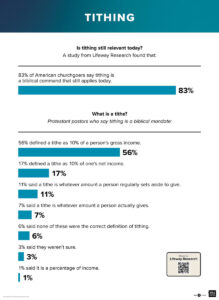The Lady Who Saved Capitol Hill Baptist Church

The Lady Who Saved Capitol Hill Baptist Church
In 1944 America was within the throes of an existential disaster. With World Conflict II nonetheless raging, the nation’s future felt unsure. However amid the worldwide turmoil, one other disaster—much less dramatic however no much less important—was unfolding in a church only a mile from the US Capitol.
After forty-one years as pastor of Metropolitan Baptist Church (later renamed Capitol Hill Baptist Church), Dr. John Compton Ball had lastly determined to retire. His was a exceptional tenure, lengthy sufficient to see two world wars, the Nice Melancholy, and the rise and fall of theological battles inside American Protestantism. Underneath his management, the church had prevented a lot of the turbulence that outlined earlier many years, notably the Fundamentalist-Modernist Controversy that tore via many denominations within the Twenties and 30s. Now, for the primary time in many years, the church was confronted with a troublesome query: Who would lead them subsequent?
President Franklin D. Roosevelt, from his wartime White Home, despatched Ball a letter of appreciation:
I can not restrain the impulse to affix the members of the congregation and different pals in a hearty, ‘effectively executed, good and trustworthy servant.’ I belief all of your days could also be radiant with the reminiscences of your 41 years spent in our Capital Metropolis Neighborhood as preacher of the Phrase of God and a pacesetter in all good works.
The respect was important, nevertheless it did nothing to ease the church’s rising anxiousness. The pulpit committee had labored arduous to discover a appropriate successor, and with Ball’s endorsement, they’d chosen Dr. Ralph Walker, a revered pastor from Portland, Oregon. The deacons unanimously accredited the nomination, and all indicators pointed to a easy transition. However then one thing exceptional occurred—one thing that might change the course of the church’s future.
This partaking Capitol Hill Baptist Church biography shares the real-life tales of odd folks in a rare place, revealing how God works via trustworthy church our bodies.
The Lady Who Spoke Up
On the congregational assembly to vote on Walker’s appointment, a longtime Sunday faculty trainer named Agnes Shankle stood up. She was not a deacon. She was not a seminary-trained theologian. However she had been on the church for a few years, and she or he knew the stakes of this choice.
She cleared her throat and voiced her issues about Walker’s theology:
Appreciable rumors have been circulating that he’s compromising in his coping with controversial questions between Fundamentalists and Modernists.
In different phrases, Walker was a person caught within the center, not the outspoken chief towards liberalism that the church wanted. In that second, the air within the room shifted. One other member spoke up, affirming Shankle’s issues.
An indication of a church’s well being isn’t merely how effectively the church’s leaders know their Bibles however how effectively the members do.
The pulpit committee, clearly shaken, realized they’d underestimated the issues of the congregation. They shortly tried to withdraw their movement and requested for 3 extra months to proceed looking for candidates. However the congregation—now alerted—refused to delay.
As a substitute, a reputation was nominated from the ground: Okay. Owen White.
White was a younger, promising preacher who had simply graduated from Southern Baptist Theological Seminary. He was widely known as a theological conservative, dedicated to biblical authority and clear doctrinal convictions. Later he would go on to steer the conservative resurgence within the Southern Baptist Conference, writing the article “Demise within the Pot,” exposing compromising views of seminary professors.
Caught in an embarrassing scenario, the pulpit committee withdrew Walker’s nomination totally. The congregation then unanimously known as White to be their subsequent pastor.

Agnes Shankle’s Ask-Search-Knock Sunday faculty class, photographed on the event of her twenty-fifth 12 months as a trainer in 1944, shortly after Okay. Owen White was known as as pastor. Shankle is seated second from the precise, subsequent to John Compton Ball (third from the precise). Additionally seated is Okay. Owen White (first from the left).
What If Agnes Shankle Had Stayed Silent?
White’s management reworked Metropolitan Baptist Church. Underneath his steerage, the church turned a bastion of conservative evangelicalism in Washington, DC, standing agency on the authority of Scripture at a time when many church buildings within the metropolis had been drifting leftward. White reformed Metropolitan via expositional preaching, cautious membership practices, discipleship packages, and a deal with evangelism. In simply 5 years, White baptized over 800 new members.
What if Agnes Shankle had stayed silent? What if she had merely gone with the pulpit committee’s judgment? What if she had thought, “Who am I to talk up? I’m only a Sunday faculty trainer.”
In your entire one-hundred-and-fifty years of Capitol Hill Baptist Church, this may show to be probably the most decisive second. Had the church known as Walker somewhat than White, the church would have doubtless headed within the route of theological compromise and liberalism, like so most of the metropolis’s church buildings.
The Entire Church Protects the Gospel
We have no idea all the explanations Metropolitan’s management put ahead a pulpit candidate who was compromising on the authority of God’s phrase. However all through historical past, God has labored remarkably via girls like Shankle who, though they didn’t have seminary levels, knew their Bibles and will inform the distinction between faith-undermining liberalism and Bible-affirming orthodoxy. She didn’t want a proper management position within the church to know that each member has the duty to guard a church’s life and doctrine.
An indication of a church’s well being isn’t merely how effectively the church’s leaders know their Bibles however how effectively the members do. It must be each church’s prayer that if its management ever makes an attempt to steer in a route of unfaithfulness to God’s phrase, there may be an Agnes Shankle of their midst who’s prepared to face up and say, “Not in my home.”
Caleb Morell is the writer of A Gentle on the Hill: The Stunning Story of How a Native Church within the Nation’s Capital Influenced Evangelicalism.
Associated Articles








